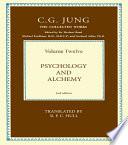Quotes from book
Psychology and Alchemy

Psychology and Alchemy is Volume 12 in The Collected Works of C. G. Jung, a series of books published by Princeton University Press in the U.S. and Routledge & Kegan Paul in the U.K. It is study of the analogies between alchemy, Christian dogma, and psychological symbolism.Alchemy is central to Jung's hypothesis of the collective unconscious. This book begins with an outline of the process and aims of psychotherapy as seen by Jung. It then moves on to work out the analogies mentioned above and his own understanding of the analytic process. Jung reminds us of the dual nature of alchemy, comprising both the chemical process and a parallel mystical component. He also discusses the seemingly deliberate mystification of the alchemists. Finally, in using the alchemical process to provide insights into individuation, Jung emphasises the importance of alchemy in relating to us the transcendent nature of the psyche.Detailed abstracts of each chapter are available online.

“Every archetype is capable of endless development and differentiation.”
Psychology and Alchemy (1952)
Context: Every archetype is capable of endless development and differentiation. It is therefore possible for it to be more developed or less. In an outward form of religion where all the emphasis is on the outward figure (hence where we are dealing with a more or less complete projection) the archetype is identical with externalized ideas but remains unconscious as a psychic factor. When an unconscious content is replaced by a projected image to that extent, it is cut off from all participation in an influence on the conscious mind. Hence it largely forfeits its own life, because prevented from exerting the formative influence on consciousness natural to it; what is more, it remains in its original form — unchanged, for nothing changes in the unconscious.

“The conscious mind allows itself to be trained like a parrot, but the unconscious does not”
which is why St. Augustine thanked God for not making him responsible for his dreams.
par. 51 p.46
Psychology and Alchemy (1952)

“Thus the soul has gradually been turned into a Nazareth from which nothing good can come.”
CW 12, par. 126 (p 99)
Psychology and Alchemy (1952)
Context: People will do anything, no matter how absurd, in order to avoid facing their own souls. They will practice Indian yoga and all its exercises, observe a strict regimen of diet, learn the literature of the whole world - all because they cannot get on with themselves and have not the slightest faith that anything useful could ever come out of their own souls. Thus the soul has gradually been turned into a Nazareth from which nothing good can come.

“People will do anything, no matter how absurd, in order to avoid facing their own souls.”
CW 12, par. 126 (p 99)
Psychology and Alchemy (1952)
Context: People will do anything, no matter how absurd, in order to avoid facing their own souls. They will practice Indian yoga and all its exercises, observe a strict regimen of diet, learn the literature of the whole world - all because they cannot get on with themselves and have not the slightest faith that anything useful could ever come out of their own souls. Thus the soul has gradually been turned into a Nazareth from which nothing good can come.